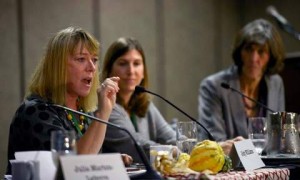 Over 33 million women worldwide were represented by 100 global women leaders at the first International Women’s Earth and Climate Summit held two weeks ago in Suffern, New York. Nobel Peace Laureate, Jody Williams, announced last week that women are putting the world on notice that women will “raise our voices followed by serious actions” pointing to possible boycotts and protests of corporations that are contributing to climate change escalation.
Over 33 million women worldwide were represented by 100 global women leaders at the first International Women’s Earth and Climate Summit held two weeks ago in Suffern, New York. Nobel Peace Laureate, Jody Williams, announced last week that women are putting the world on notice that women will “raise our voices followed by serious actions” pointing to possible boycotts and protests of corporations that are contributing to climate change escalation.
Global grassroots women met with women world leaders “to bridge the gap between the women on the ground and the world policy makers”. The global women addressed protecting the water, oceans, air, and forests, focusing on the need for a deep systemic change concerning carbon emissions. High on the list of concerns was protection of food sovereignty/ stability, how oil, coal, fracking, and nuclear industries which are negatively impacting climate change, (and human rights issues surrounding these issues), protection of tribal lands and peoples, and protection of the rainforests.
Osprey Lake, Co-Director of the recent International Women’s Earth and Climate Summit, proclaimed, “Nature is not waiting while politicians debate. We need a deep overall analysis about climate change right now. Enough is enough.”
Dr. Sylvia Earle re: Oceans
Speaking from the Women’s Summit, [in an exclusive phone interview with Jane Ayers Media,] one renowned delegateNational Geographic Marine biologist, Dr. Sylvia Earle,addressed the climate change dangers to the oceans, “Right now we are in the ‘sweet spot’, the right spot to secure ourselves, but we have to hurry.” Pointing to the loss of half of the coral reefs, vast amounts of fish species, and a threat to plankton which produce oxygen, Dr. Earle pointed out immediate change is needed.
Dr. Earle warned, “Global warming has a great impact on all life. There’s a range favorable for all species, from microbes to humans to whales. Right now the warm temperatures are somewhat okay, but the long-range overall warmer settings predicted could bring rapid changes with unknown consequences ~ not favorable to mankind.
She requested, “Look at the consequences and take seriously all the needs of the air, land, water in the rivers, lakes, and oceans. We have the power to not dam all the rivers. We have the power to not pollute the air. We have the power to not cut down all the trees. If we cut down all the trees, old-growth or rainforests, it will not be good for humankind. We have the power to not cut down all the trees, because it drastically impacts us.”
Concerning the Fukushima nuclear disaster, Dr. Earle lamented, “Radioactivity is one more impact we have infected into the ocean system. Oceans are resilient but we are facing tipping points. With carbon at 400/ we have crossed the line. How much decline in plankton is acceptable? We all like to breathe but if we destroy the systems that make oxygen and that take up the carbon, then what? This is the last time we have to assert ourselves and make it right. Most oxygen is generated by creatures in the sea. Everyone has a stake in this. Yes, we need to take care of the water, but we also need to take care of the living parts of the water, i.e. the fish.”
Pointing to a crossroads mankind is facing, Dr. Earle explained, “I joked at the International Women for Earth & Climate Summit that women can help find solutions to climate change by focusing on the oceans because half the fish in the ocean are female. But seriously, we are in a moment in time, at a crossroads, where we are facing global rising sea levels, floods increasing, etc. We are at a pivotal point in time, and I am emphasizing the role of oceans to governments, and the world. The plankton play a largely neglected role but they generate the oxygen that takes up the carbon. The plankton are most important to humankind surviving, and makes the planet function properly. “
Stating that the ocean keeps us alive, Dr. Earle explained, “Most people might think the ocean is only a source of recreation or fishing. But we must recognize that the ocean keeps us alive. It is a cornerstone of life’s system, and only now are we appreciating how important oceans are to every breath we take, to every drink of water we injest. We have impacted the oceans over the last fifty years, and now we have an unprecedented chance to solve some of these problems.”
Source: Nation of Change
Author: Jane Ayers
Please give me credit for writing the above article… by Jane Ayers
thanks~~
Also it was originally published in Nation of Change